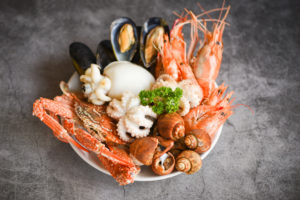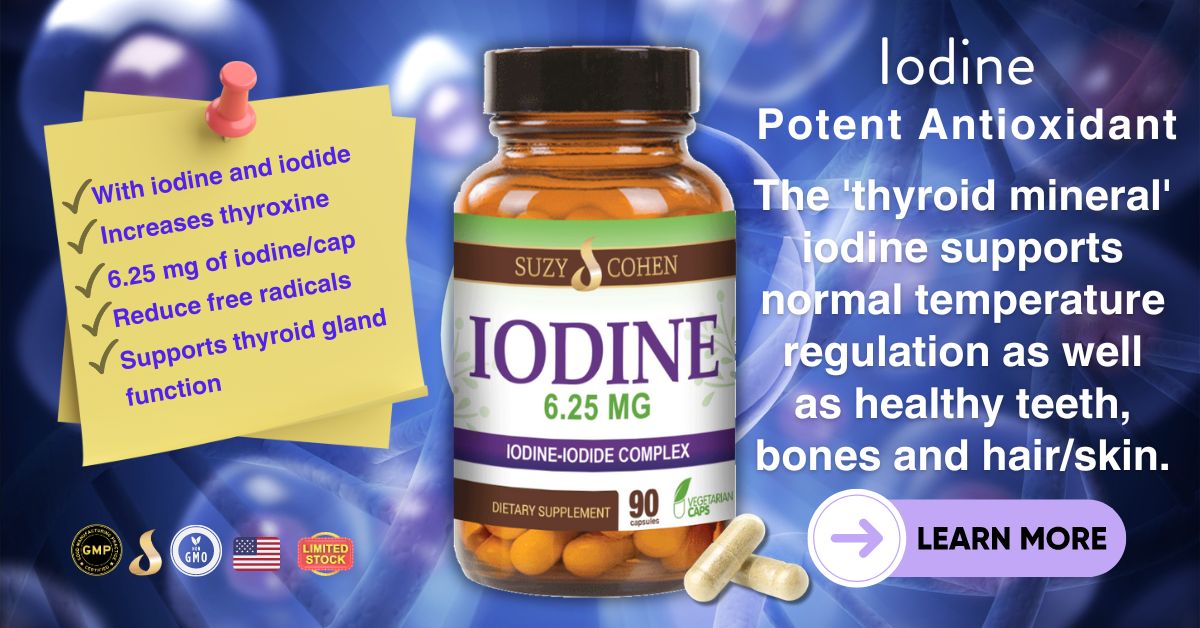What's On This Page?
ToggleSome people think that a shellfish allergy is an iodine allergy, but they are not exactly the same. Iodine but not shellfish helps with radiation exposure. There’s been a lot of fear associated with a potential nuclear radiation leak from Ukraine. I wrote an article about that which you can READ HERE.
Recently, I received a question from a reader who has a known shellfish allergy. He wanted to know if he could have a procedure using iodine contrast because he had read my ARTICLE about the dangers of gadolinium-based contrast agents. The confusion arose because he was told he could not have the iodine-based contrast either due to the shellfish allergy.
Since I write an opinion column, I will use my knowledge as a pharmacist and give you all my opinion about this. The concern about iodine contrast allergies in people with shellfish allergies is overblown. The risk is very low, somewhere around the 2 to 3 percent range, meaning that if you’re allergic to shellfish, you will also be allergic to iodine contrast agents used for MRIs or other guided imagery procedures.
The shellfish allergy is due to a specific protein found in the fish, it’s not due to iodine. Iodine, the natural mineral of iodine is needed to sustain life. Furthermore, iodine dietary supplements are minerals, similar to minerals like potassium, magnesium, calcium, zinc, and selenium.
Iodine supplements (as opposed to iodine-based contrast dyes which are drugs) are useful if you have a deficiency. Deficiencies are more common than you think. Eating shellfish does not restore an iodine deficiency.
Let me now summarize and clarify all of this:
Shellfish Sensitivities Are Not Limited to One Food
If you are allergic to shellfish, my opinion is that you can still take iodine supplements because shellfish allergies are due to a protein in the meat such as tropomyosin or other fish proteins. If you’re allergic to one type of shellfish, you might be allergic to others.
For example, if you react to lobster, you should probably avoid shrimp. If you have allergies to crab, it’s best to avoid crawfish and so forth. But iodine supplements have nothing to do with these crustaceans.
Iodine-Based Contrast Has Nothing to Do with Shellfish
If you are allergic to iodine contrast, you will obviously be offered gadolinium-based contrast, but this type of allergy has nothing to do with shellfish either. Iodine contrast is a drug, it is not related to iodine minerals which you need to live. Now, this is where my opinion comes in.
Today, the MRI equipment used to see inside the body is incredibly sophisticated. There are many instances today where the imaging device can take a crystal clear ‘picture’ without the need for ANY contrast. And if that’s possible for you, that is what I’d recommend you do. Skip the contrast if possible.
Your radiologist will be skilled and tell you if that’s possible. If you do opt for the gadolinium contrast, please read my article HERE. If you opt for iodine contrast, you may be interested to know that it may cause kidney harm (similarly to gadolinium), as well as hyperthyroidism reactions and possibly an accumulation of metformin if you take that drug for diabetes.
Iodine is in Seafood and Shellfish
The purplish-grey mineral is needed for our survival. There is a lot of confusion surrounding this supplement because people assume iodine is a drug, but that’s not true. It’s as natural to your body as magnesium or calcium.
Let me try to help you find out if you’re possibly deficient because if you are, you could simply take a supplement once a day, or maybe a few times a week, or even once every Saturday!

Here are 5 signs of possible iodine deficiency:
1. Goiter
You may have an enlarged thyroid and it will look like a lump at the base of your neck. If you eat a lot of processed foods, you might have a higher risk for this. Goiters are sometimes treated with iodine supplementation (usually with physician supervision) in the hopes they shrink without surgery.
Not all goiters are related to low iodine however, iodine deficiency is the most common cause of goiters and nodules in the thyroid gland. Sadly, some physicians surgically remove the thyroid gland instead of suggesting natural supplements of iodine. I talk about goiter in my other article, The Secret Nutrient that Helps Graves’ Disease.
I’m not sure what the rationale is for thyroidectomy in the case of a goiter (because your body is still woefully deficient in iodine, and the breasts are next, but you can have a conversation with your own physician about treating a goiter). According to the American Thyroid Association, “Iodine deficiency can lead to enlargement of the thyroid.”
Sometimes a goiter can cause the sensation of choking or difficulty swallowing or breathing. It is something you need medical attention for, but I also want you to know the most common cause of it is low iodine.
2. Breast Pain or Cancer
Iodine deficiency causes tiny benign (noncancerous) cysts to begin forming in the breasts too. So it’s not just nodules in the thyroid, it occurs in the breasts as well if the deficiency becomes chronic. The condition is termed Fibrocystic Breast Disease. Women with this condition have slightly lumpy breasts and breast tenderness. Sometimes it’s hard to enjoy a hug because the pain is so bad. Continued iodine insufficiency may increase the risk of breast cancer as well.
3. Feeling Tired or Weak
Low iodine always leads to low levels of thyroid hormone. That’s because your thyroid gland requires iodine to produce thyroxine, your thyroid hormone. This is the hormone that makes you feel strong, energetic, and full of vitality. Without thyroid hormone, you are apt to die early.
Hypothyroidism will always lead to feeling tired, chronic fatigue and weakness. Often you will also see shortness of breath with little exertion. So the symptoms of low iodine look identical to symptoms of low thyroid because you will become hypothyroid. You may be interested in my other article entitled, 12 Critical Thyroid Myths and Facts.
There is another link between chronic fatigue, it is not always tied to thyroid problems. Read my article, The Link Between Chronic Fatigue and Viral Infections.
4. Dry Skin
Iodine is needed for soft skin and healthy skin. Eczema is sometimes related to low iodine or hypothyroidism. Thyroid hormones contain natural iodine as part of their molecular structure so iodine is needed in order to help your skin cells regenerate. When iodine levels are low, this regeneration doesn’t occur as often as it should and this leads to dull, itchy, dry skin. Over 75 percent of people with hypothyroidism have skin problems such as this.
5. Pregnancy and Baby’s Brain
People underestimate iodine’s power on the brain. We always talk about other brain-nourishing supplements like bacopa or ginkgo, but iodine is very important. In fact, insufficient iodine during pregnancy can increase a baby’s risk for mental retardation. Did you know that?
The Importance of Iodine in Pregnancy
Young women don’t think about iodine because their doctors always talk about folic acid, however, the importance of iodine can’t be underestimated. First of all, if you’re deficient in iodine, the risk of miscarriage is increased. But there are implications for the baby too, if the mother is not a seafood lover, or has iodine deficiency for some other reason.
When a mother’s iodine is deficient, she has what we call “hypothyroxinemia” which is the term to describe low maternal T4 (thyroxine). This condition can damage the developing brain in the fetus but to what extent, we cannot know. A baby may be born with neonatal hypothyroidism. If it is recognized, both mother and child can be easily treated with pills or supplements.

In its most severe outcome, iodine deficiency leads to cretinism, which means severe and profound mental retardation.
Since doctors now tell women to limit seafood due to mercury concerns (and a dirty ocean full of plastics and phthalates), I urge you to talk to your OB/GYN to see if a clean supplement of iodine is something you should take a few days of the week in preparation for pregnancy. Excellent brands of iodine contain both iodine and iodide, two different isomers of the molecule that feed and nourish your thyroid gland and breasts.
Understanding the pathogenesis of hypothyroidism and its connection to impaired iodine status has led to the prevention of this problem today. If recognized by a doctor, the treatment and proper counseling become very simple and straightforward.
If you’d like to learn more about thyroid disease, read my article entitled: Why Cells Don’t Absorb Thyroid Hormone.

Suzy Cohen, has been a licensed pharmacist for over 30 years and believes the best approach to chronic illness is a combination of natural medicine and conventional. She founded her own dietary supplement company specializing in custom-formulas, some of which have patents. With a special focus on functional medicine, thyroid health and drug nutrient depletion, Suzy is the author of several related books including Thyroid Healthy, Drug Muggers, Diabetes Without Drugs, and a nationally syndicated column.


